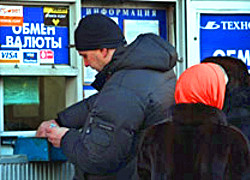Nezavisimaya Gazeta: Lukashenka loses his best card
57- 12.01.2015, 8:59
- 108,798

Belarus has faced signs of instability in the year of the presidential “elections”.
The authorities officially accepted a 30% devaluation of the national currency in the first week of the new year and warned they would not spend the country's gold and foreign currency reserves on keeping the ruble at the current level. Companies hurry to rewrite business plans, experts warn about a decline in living standards and politologists try to guess the slogans of Aliaksandr Lukashenka's presidential campaign, Nezavisimaya Gazeta writes.
The new government and administration of the National Bank, which were appointed ahead of the New Year's Eve, hurry to correct the mistakes of the previous administration. A tax on selling foreign currency (30%), which paralysed economic activity in the country, has been lifted and the Belarusian ruble fell against the dollar 30%, the size of the tax.
Experts say the economy got off easy, because the situation was fixed quickly and during the new year celebrations. “We think that common sense has won... Okay, the devaluation was carried out. But why did they impose the tax that had to be paid from incomes? Why the devaluation was carried out in such an exotic way? We were angry not at the devaluation itself but at the way it was carried out,” Aliaksandr Shvets, the head of the Belarusian Scientific and Industry Association, says.
Unlike Russia, Belarus didn't plan to have the New Year's vacation, but most companies have to go on holiday because they were unable to work due to the decision on paying the tax on the purchase of foreign currency from incomes.
It's premature to speak about stability in the country. Companies revise their business plans due to the devaluation. Directors complain they had to annul the results of tenders for imported raw materials that were held last year. Organising new tenders seems impossible so far, because importers are not ready to make proposals. Firstly, a ban on price increase that was imposed by the old government remains in force until January 15. Secondly, experts suppose that the devaluation won't stop at 30%.
The ground for such expectations is the unprecedentedly low level of the country's gold and foreign currency reserves – only 5 billion dollars. The amount is able to cover only a month's imports, while the minimum standard is three months of imports. The reserves reduced 13%, or 760 million dollars, in December. The government has to pay $4 billion of debts in 2015. “The state cannot afford and should not undertake any commitments regarding the ruble rate,” Belarusian economic expert Aliaksandr Chubryk says.
The third factor that hinders importers from resuming their work is expectations of administrative restrictions regarding the volume of imports. Ahead of the New Year's Eve, the Ministry of Trade began to check and close without warnings the shops that “have violations regarding the items list” or, in simple terms, sell foreign goods instead of Belarusian ones. The number of reasons for closing shops increased after the ban on raising prices. Twelve more stores, including two online shops, were closed during the first week of the new year.
Belarus depends on imports to a great extent. The country imports more raw materials and components for its own industry rather than consumer goods. The state paralysed the work of importers and thus stopped the work of many domestic enterprises.
Experts praise the first measures taken by the new government – market-based pricing and a stricter monetary policy (the refinancing rate, as well as interest rates on deposits and loans, was raised) – and think the continuation of this economically reasonable policy will lead to a decline in the standard of living. It's for a reason that Aliaksandr Lukashenka warned about the “austerity regime”.
“Austerity measures mean that people will have lower incomes, lose their salaries and some companies will go bankrupt,” Aliaksandr Chubryk explains. In the current situation, when Belarus can hardly hope for help from its closest ally Russia, which has enough of its own problems, the country can “stop saving and begin to grow” only if structural reforms are carried out, all the more so because Belarus's another big creditor, the International Monetary Fund, is ready to issue loans for that purpose.
Even if we forget about the government's principled disagreement with market mechanisms, the authorities do not want to launch reforms, which are always painful, ahead of the presidential elections. Experts can only guess what Aliaksandr Lukashenka will tell voters to convince them that he is the only suitable candidate.
“It is considered black humour by many to say about the unique Belarusian stability, when the country has survived four devaluations since 2009,” political observer Aliaksandr Klaskouski says. “It is profitable for the authorities at least to blame Moscow for the current financial crisis.”









